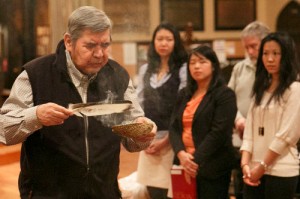By the Rev. Bob Bettson

With the haunting beat of a drum as accompaniment, more than 130 people took part in a vigil for the Earth on Jan. 16 at Holy Trinity, Trinity Square, Toronto. They prayed in the four directions and sang songs of thanksgiving to God for the gift of water. Instead of receiving communion, they joined indigenous Bishop Mark MacDonald in a ceremony of thanksgiving for water, followed by an invitation for all to come forward and drink a cup of water from a font.
After the ceremony, participants were invited to take small samples of the water back to their own faith communities, as a sacred sign of the need to reclaim bodies of water threatened by pollution, acidification and exploitation. The vigil was sponsored by Holy Trinity, the diocese’s Creation Matters group, and Anglican members of JustEarth, an environmental group.
Bishop MacDonald, the Anglican Church of Canada’s first national indigenous bishop, said the gathering, and many like it across Canada, is evidence of a growing concern about two areas of public policy that have been neglected by the current federal government—aboriginal affairs and the environment.
Bishop MacDonald expressed hope that what is happening in the aboriginal community in Canada is similar to what happened for African-American Christians in the United States, which translated into the Civil Rights movement. He paid tribute to Idle No More, which has spread beyond the indigenous community to the broader community. In an interview at the vigil, he said the Idle No More movement has succeeded because it has forcefully communicated indigenous issues to the general population with a “minimum of mayhem.”
He has ambiguous feelings about the blockades and disruptions of transportation services. But he acknowledges the “tremendous frustration” felt for years as indigenous people have watched unresponsive federal governments ignore problems. He said the environmental and indigenous movements are natural allies, but there is a danger when environmentalists impose their agenda, without listening. The listening process will be necessary when dealing with natural resource development issues and the proposed Keystone pipeline in northern B.C., he said.
He said environmentalists and indigenous people can agree that the recent passage of the omnibus bill which removes environmental protection standards from many of Canada’s waterways is “just plain wrong.” He notes that for indigenous people, this is a matter of life and death.
Alanna Mitchell, the former environmental writer for the Globe and Mail, and author of Sea Sick, the Global Ocean in Crisis, gave an address as part of the liturgy. She said people don’t generally think much about water, yet fresh water is less than one per cent of the earth’s water supply, and with the oceans deteriorating due to excess carbon emissions, humanity faces the same fate as the dinosaurs if it doesn’t change its ways. “We can make it stop. We just aren’t doing it,” she said. (Download Ms. Mitchell’s address.)
Murray MacAdam, the diocese’s Social Justice and Advocacy consultant, outlined some possible responses for participants concerned with environmental issues: talk to MPs, become active in groups working on environmental issues, and raise these issues in church congregations. “It is easy to feel despair,” he said. “Yet we can see hope. We can be part of a huge awakening, a worldwide environmental movement. We’ve come a long way, but we have a long way to go.”